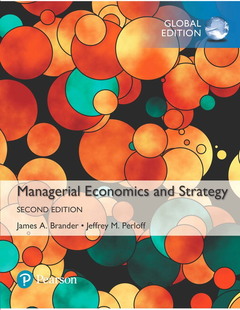Description
Managerial Economics and Strategy, Global Edition (2nd Ed.)
Authors: Perloff Jeffrey, Brander James
Language: English
Subject for Managerial Economics and Strategy, Global Edition:
704 p. · 20.6x25.4 cm · Paperback
Description
/li>Contents
/li>Comment
/li>
For courses in Managerial Economics.
A Problem-based Approach that Uses Modern Theories and Real-world Examples
Managerial Economics and Strategy uses real-world issues and examples to illustrate how economic principles impact business decisions. Emphases on agency and contract theory, managerial behavioral economics, game theory, and pricing are especially valuable to future managers. In-text examples and boxed mini-cases use actual data to illustrate the use of basic economic models, while Q&As pose important managerial or economic problems and demonstrate a step-by-step approach to solving them.
The Second Edition has been fully revised and updated to reflect new supply-and-demand curves and include discussions of corporate social responsibility, opportunistic behavior, and innovation. It also features new learning objectives, examples, end-of-chapter questions, and spreadsheet exercises.
Also available with MyEconLab®
MyEconLab is an online homework, tutorial, and assessment program designed to work with this text to engage students and improve results. Within its structured environment, students practice what they learn, test their understanding, and pursue a personalized study plan that helps them better absorb course material and understand difficult concepts.
NOTE: You are purchasing a standalone product; MyEconLab does not come packaged with this content.
If you would like to purchase both the physical text and MyEconLab search for:
0134472551 / 9780134472553 Managerial Economics and Strategy Plus MyEconLab with Pearson eText -- Access Card Package
Package consists of:
- 0134167872 / 9780134167879 Managerial Economics and Strategy
- 013416976X / 9780134169767 MyEconLab with Pearson eText -- Access Card -- for Managerial Economics and Strategy
1. Introduction
2. Supply and Demand
3. Empirical Methods for Demand Analysis
4. Consumer Choice
5. Production
6. Costs
7. Firm Organization and Market Structure
8. Competitive Firms and Markets
9. Monopoly
10. Pricing with Market Power
11. Oligopoly and Monopolistic Competition
12. Game Theory and Business Strategy
13. Strategies over Time
14. Managerial Decision Making Under Uncertainty
15. Asymmetric Information
16. Government and Business
17. Global Business
Answers to Selected Questions
Definitions
References
Sources for Managerial Problems, Mini-Cases, and Managerial Implications
Index
Credits
This title is a Pearson Global Edition. The Editorial team at Pearson has worked closely with educators around the world to include content, which is especially relevant to students outside the United States.
About the Book
Helps Future Managers Learn to Solve New Problems
- NEW! A Managerial Problem begins each chapter using a real-world, important issue to managers, including the effect of the introduction of generic drugs on the pricing of brand name drugs.
- A Managerial Solution concludes each chapter and illustrates how managers can use economic tools and concepts to address the chapter-opening managerial problem.
- Managerial Implications are boxed applications that illustrate how managers can use economic theory to make better decisions. Examples include how to avoid holdup problems in contract disputes, and whether a manager should focus on stock prices or profits.
- NEW! Learning objectives have been added to the beginning of each chapter.
- NEW! 88 End-of-chapter questions have been added to test students’ knowledge.
Teaches Students the Business Implications of their Decisions Using Real-world Cases and Spreadsheet Analysis
- NEW! In-text examples and boxed mini-cases use actual data to illustrate how to use basic models. For example, to illustrate rivalry in oligopolistic markets, the authors look at rivalry between United and American Airlines and between Coke and Pepsi. Other examples include why American Apparel is vertically integrated, and why upscale manufacturers limit the number of designer handbags a customer is allowed to buy.
- Q&As help students learn how to solve qualitative or quantitative problems such as how to determine a firm’s best-pricing scheme.
- NEW! Spreadsheet Exercis



